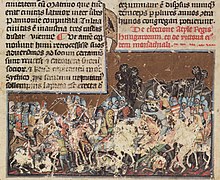User:OrionNimrod/Battle of Tárnok Valley and Battle of Zeiselmauer
| Battle of Tárnok Valley | |||||
|---|---|---|---|---|---|
 (Chronica Hungarorum, 1488) | |||||
| |||||
| Belligerents | |||||
| Huns | Romans | ||||
| Casualties and losses | |||||
| Heavy | Heavy | ||||
The Battle of Tárnok Valley (Hungarian: Tárnokvölgyi csata) and the Battle of Zeiselmauer were a legendary battles in the medieval Hungarian chronicles between the Huns and Romans in Pannonia.
Detre of Verona and his army of Italians, Germans, and other peoples joined forces with Macrinus at Sicambria, where they were attacked by the Huns in the middle of the night. Detre and Macrinus fought several days in retaliation on the field of Tárnok Valley, across the Tisza, and near the town of Tulln (now in Austria, not far from Vienna). There were heavy losses on both sides, including Captain Keve, who died during the Battle of the Tárnok Valley.[1]

After the Huns, namely the Hungarians experienced the bravery of the Romans and the way of their warefare, they reorganized their army, rushed the Transdanubian regions of Pannonia, took possession of them and they moved the people of their house here, then they moved towards the city of Tulln, where their opponents were assembled. Detre, Macrinus, and all the available forces of the Roman army marched against them on the field of Zeiselmauer. Both opponents attacked the opposing teams with equal fierceness. And the Huns wanted to die rather than retreat in the battle, according to Scythian custom they made a terrifying noise, they beat their drums and used every weapon against the enemy, but most of all their innumerable number of arrows. This caused the Roman troops to be confused, and so the Huns made a great slaughter among them. The morning began, and in a fierce battle which lasted until nine o'clock, the Roman army was defeated and put to flight with enormous loss.

References
[edit]- ^ László, Geréb; Zsófia, Geréb; Attila, Szabó. "Capable Chronicle About the Old and Recend Deeds of the Hungarians, Their Origin and Growth, Their Triumphs and Their Courage". mek.oszk.hu. Retrieved 2022-11-16.
- ^ Thuróczy, János (1918). A magyarok krónikája [Chronicle of the Hungarians] (in Hungarian). Translated by Horváth, János. Magyar Helikon.
